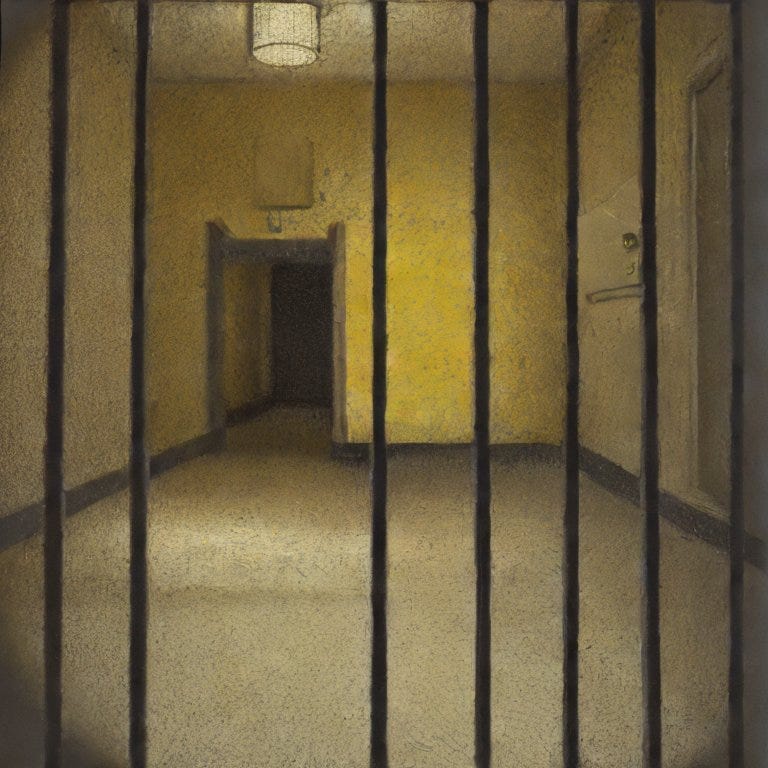Prisoner of the Ideal
Perfection as a mind prison
My inner monologue has an eye for detail, finds gaps easily, and wants to maximize everything. It’s a restless perfectionist.
It may not be a clinical compulsion, but it fills my mind with inclement thoughts. “Why did you park so far away?” “Why didn’t you ask her a follow up question about her trip to Portugal during your date?” “Why did you just throw it all away to chase a dream that could vanish as easily as morning fog?”1
In my attempt to trace the origins of my perfectionism, I’ve submerged 20,000 leagues to the bottom of my sea to find my own mind monster–the architect of my tendencies to question everything and feel I’m never enough.
My expedition has shown me that my penchant for maximization stems from my desire to be loved. I’m an Enneagram 2, which means that my primary motivation is the desire to be loved, and my primary fear is not being wanted.2 This core desire and fear are the magnetic fields which direct my life.
I yearn to be perfect when interacting with others to show how thoughtful I can be. How I can make people feel safe, understood, and seen in a way no one does. The price to pay for their love is my obsession to be the very best interaction they’ve had with another human. Never mind the fact that I cannot tell you precisely what the perfect interaction looks like though; it’s a mirage.
Therefore, I yearn to be perfect to garner respect, and eventually be loved. To be sought after and cared for in a reciprocal manner. To be valued for my being, not my doing.
It’s exhausting. I particularly feel it during dates. I enter this quantum state where I’m trying to be as present as possible in my interaction, commenting on their golden necklace with an emerald pendant and asking the story behind it, while simultaneously trying to forecast all of her possible responses and my responses to her responses to find the one that brings the most delight and comfort. In the process, I become so adaptable that I turn into a blob malleable enough to become whatever I think that other person wants.3 My adaptability is often mistaken for spinelessness. I’m just trying to be their ideal mate.4
I’ve become a prisoner of the ideal and in the process rob myself of the freedom that comes with the compassion of knowing nothing is perfect. The quest for optimal everything will always get a flat tire–an unexpected obstacle. In those moments, I chide my lack of foresight instead of the more compassionate and reasonable thought: Shit happens.
The darker side of being imprisoned by the search for the ideal is that not only am I robbing myself of compassion, but also obstructing my ability to show the world compassion.
Not long ago a barista served me a whole milk vanilla mocha for “Carmelo,” prompting a smug retort: “It was soy, just the mocha, and it’s C-A-M-I-L-O.” In that fit of righteousness, I forgot that I too was a barista, fucked up orders, and was accused of being racist because of it once.
The absence of compassion from my inner monologue gave me no model for treating others with kindness. If you don’t see compassion, how could you ever model it?
In my deep sea expedition, I realized that the pursuit of the ideal makes us less compassionate with ourselves, and in turn, the world.
Sabbatical life has filled me with so many unperfect moments that I’ve had no choice but to be kinder to myself, lest I run the risk of running my mind through a Nutribullet of self-criticism. My desire to love comes from a good place–I’m lucky to have that capacity. But it can cage me in a cell of the impeccable and perfect that prevents me from finding compassion in myself and others. It is only by surrendering that I can escape my prison of the ideal.
Thank you to Vincent Tam , Sunday Candy, Farrar Pace, and Brenda Geary for helping shape this essay.
Until next time!
Ok, it doesn’t ask questions in such elegant form. But you get the idea.
You can make the claim that Enneagram is another cutesy pseudo-scientific test like Myers-Briggs. However, I’ve found it immensely helpful in deepening my awareness.
My toxic trait is that sometimes I become the Lebron James of people pleasing.




If I had to rank every conversation I have shared with you on a scale of unideal to ideal, the scale would prove inadequate. The worst part of trying to control others perception of us and the fixation on being worthy of their love, is that it neglects to leave space for their narrative. And in this case my narrative for Camilo entirely rejects the word ideal. I feel so much love for you, you are delicately caring and hilarious in equal proportions, and I am so lucky to know you. I constantly tell Auston that I can’t stand that my internet friends are internet friends. I want to spend every day with them. I am the writer I am because of them, and slowly but surely, becoming the person I am because of them.
Anyways I’m done ranting. I feel every ounce of every word you just wrote and want you to know that you are loved dear friend.
“To be valued for my being, not my doing.” 🔥